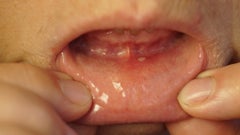
Dulera
Dulera (mometasone / formoterol) is an inhaler that's used for the maintenance treatment of asthma in adults and children. It's a combination medication containing an inhaled corticosteroid (ICS) and a long-acting beta agonist (LABA) that work together to help make breathing easier. Dulera (mometasone / formoterol) is inhaled through the mouth twice per day. But the specific dosage depends on how old you are and how severe your asthma symptoms are. Side effects include common cold symptoms and headache. This medication isn't available as a lower-cost generic yet.

What is Dulera (mometasone / formoterol)?
What is Dulera (mometasone / formoterol) used for?
Maintenance treatment of asthma in people ages 5 years and older
How Dulera (mometasone / formoterol) works
Dulera (mometasone / formoterol) is a combination of two medications that work together to help treat asthma symptoms.
Mometasone is an inhaled corticosteroid (ICS). It's thought to work directly in your lungs to lessen inflammation and swelling in your airways. This helps make it easier for you to breathe.
Formoterol is a long-acting beta agonist (LABA). It works by relaxing the muscles in your lungs. This opens up your airways so that you can breathe more easily.
Drug Facts
More on Dulera (mometasone / formoterol) essentials

Get your GoodRx coupon

What are the side effects of Dulera (mometasone / formoterol)?
Common Side Effects
- Sore throat, stuffy nose, and other symptoms of the common cold (5%)
- Headache (up to 5%)
- Pressure in the sinuses and other symptoms of a sinus infection (up to 3%)
Other Side Effects
- Chest pain
- Blurry vision
Serious Side Effects
- Serious allergic reaction: hives; rash; itchy skin; flushed skin; swelling of the face, lips, or tongue; difficulty breathing
- Sudden narrowing of your airways: difficulty breathing, wheezing, chest pain or tightness, cough
- Changes to stress hormone levels: weight gain around your gut, puffiness of the face, muscle weakness in arms or legs, easy bruising, stretch marks around the belly, tiredness, mood changes, nausea, vomiting
- Heart problems: dizziness, fatigue, weakness, rapid heartbeat
Source: DailyMed
More on Dulera (mometasone / formoterol) side effects
The following side effects have also been reported
Along with its needed effects, a medicine may cause some unwanted effects. Although not all of these side effects may occur, if they do occur they may need medical attention.
Check with your doctor immediately if any of the following side effects occur:
Less common
headache
muscle aches
pain or tenderness around the eyes and cheekbones
stuffy or runny nose
tightness of the chest
troubled breathing
unusual tiredness or weakness
Rare
Sore mouth or tongue
white patches in the mouth or on the tongue
Incidence not known
Blindness
blurred vision
cough or hoarseness
creamy white, curd-like patches in the mouth or throat
darkening of the skin
decreased vision
dizziness
fainting
fever or chills
loss of appetite
lower back or side pain
mental depression
nausea or vomiting
pain when eating or swallowing
painful or difficult urination
skin rash
tearing
Some side effects may occur that usually do not need medical attention. These side effects may go away during treatment as your body adjusts to the medicine. Also, your health care professional may be able to tell you about ways to prevent or reduce some of these side effects. Check with your health care professional if any of the following side effects continue or are bothersome or if you have any questions about them:
Less common
Voice changes
Other side effects not listed may also occur in some patients. If you notice any other effects, check with your healthcare professional.
Call your doctor for medical advice about side effects. You may report side effects to the FDA at 1-800-FDA-1088.

Pros and cons of Dulera (mometasone / formoterol)

Pros
Works well to improve lung function and lessen asthma symptoms
Combines two different asthma medications into a single inhaler for convenience
Can use with a spacer if you have trouble using the inhaler

Cons
Doesn't replace your rescue inhaler
Need to inhale 2 puffs twice daily for it to work well
Can raise your risk for infections

Pharmacist tips for Dulera (mometasone / formoterol)

Use Dulera (mometasone / formoterol) twice daily at the same times every day. This medication works best if it's taken regularly every day.
Use a rescue inhaler such as albuterol (Ventolin) if you have sudden trouble breathing during an asthma attack. Dulera (mometasone / formoterol) won't treat an asthma attack as it's happening.
Call your prescriber if your breathing or peak flow meter results worsen. Also contact your care team if you need to use your rescue inhaler more often than usual. These could be signs that you need some treatment changes to help manage your asthma better.
Don't use Dulera (mometasone / formoterol) more often than recommended. Otherwise, your risk is higher for side effects like nervousness, headache, a racing heart, tremor (shakiness), dizziness, and trouble sleeping.
Dulera (mometasone / formoterol) inhalers are color coded based on dosage strength. The 50 mcg/5 mcg inhaler is blue, the 100 mcg/5 mcg inhaler is yellow, and the 200 mcg/5 mcg inhaler is purple. Be sure you know which strength you have and what your dose is. Your dose might change or you might get prescribed a new inhaler with a different strength depending on how well your asthma is improving.
Prime the Dulera (mometasone / formoterol) inhaler before you use a new inhaler for the first time or before you use your inhaler when you haven't used it in more than 5 days. To prime the inhaler, hold it upright and and spray 4 times into the air away from your face. Shake the inhaler well between each test spray.
Shake the Dulera (mometasone / formoterol) inhaler well before every puff. Breathe out through your mouth as much as you can before you place your lips firmly around the mouthpiece. Then, take a slow and deep breath through your mouth as you push the button on the top of the canister to get the medication out. Try to hold your breath for up to 10 seconds or for as long as you comfortably can. This allows time for the medication to reach deep into your lungs.
Wait at least 30 seconds between each puff of Dulera (mometasone / formoterol).
Rinse your mouth with water and then spit after you take your 2 puffs of Dulera (mometasone / formoterol) for each dose. This helps lower the risk for thrush (fungal infection) in the mouth and throat.
There's a dose counter on the Dulera (mometasone / formoterol) inhaler. Use this counter to keep track of when you need to get a refill.
How to clean Dulera (mometasone / formoterol): Wipe the mouthpiece of the inhaler with a clean, dry tissue at least once a week. Don't use water to clean any part of the inhaler.
How to store Dulera (mometasone / formoterol): Keep Dulera (mometasone / formoterol) at room temperature. The inhaler either contains 60 or 120 puffs (actuations). Keep the 60-actuation inhaler with the mouthpiece down or sideways. You can place the 120-actuation inhaler in any position.

Frequently asked questions about Dulera (mometasone / formoterol)

How to save using GoodRx




What are the risks and warnings for Dulera (mometasone / formoterol)?
Dulera (mometasone / formoterol) can cause some serious health issues. This risk may be even higher for certain groups. If this worries you, talk to your doctor or pharmacist about other options.

Not for use for asthma attack or worsening breathing
Don't use Dulera (mometasone / formoterol) if you're having an asthma attack because this medication won't provide relief right away. Use a rescue inhaler, such as albuterol (Ventolin), if you're having trouble breathing.
Let your prescriber know if you're using your rescue inhaler more often than usual because this could mean that your asthma is getting worse. Don't use more doses of Dulera (mometasone / formoterol) than recommended because it won't improve your breathing. Rather, it can raise your risk for side effects, such as heart problems, tremors, and dizziness.

Fungal infection in the mouth (oral thrush)
Risk factors: Not rinsing and spitting after using Dulera (mometasone / formoterol) | Weakened immune system from medical conditions or medications
Dulera contains mometasone, a steroid medication. When inhaled through the mouth, steroids can cause a fungal infection in the mouth and throat called thrush. Rinse your mouth with water and spit after each time you use Dulera (mometasone / formoterol) to lower your risk for thrush.
Tell your prescriber if you notice symptoms of thrush, like white patches in your mouth, cotton-like feeling in your mouth, pain while eating or swallowing, or loss of taste. You might need to take medication to treat thrush. Sometimes, you might need to temporarily stop Dulera (mometasone / formoterol) until the thrush goes away.

Sudden narrowing of your airways (bronchospasm)
Inhaled medications, including Dulera (mometasone / formoterol), can sometimes cause a muscle spasm in your lungs (bronchospasm). This can lead to difficulty breathing, wheezing, cough, and chest discomfort right away you inhale the medication. These breathing problems can be life-threatening. Use your rescue inhaler and get medical help right away if you have a hard time breathing right after you inhale Dulera (mometasone / formoterol).

Higher risk of infections
Like all corticosteroid-containing medications, Dulera (mometasone / formoterol) can weaken your immune system. As a result, it can raise your risk for infections, including upper respiratory infections and pneumonia. Your risk for infections is higher if you're taking other medications that also weaken the immune system.
Let your prescriber know if you're currently being treated for a serious infection, such as tuberculosis (TB). Your prescriber might need to consider a different medication for your asthma until you get better. Let your prescriber or primary care provider know right away if you have symptoms of an infection, such as fever, chills, or body aches.

Caution when switching from oral to inhaled steroids
Risk factors: Long-term use of oral steroids | Suddenly stopping prednisone 20 mg or equivalent dose of steroid
Some people might switch from an oral steroid (taking a steroid medication by mouth) to an inhaled steroid like Dulera (mometasone / formoterol). Switching from an oral steroid to an inhaled steroid can cause the levels of the stress hormone called cortisol to drop suddenly in the body. This can lead to withdrawal symptoms, like nausea, tiredness, weakness, or muscle and joint pain. Low cortisol levels can also affect how well the body responds to stressful situations, such as trauma, surgery, and infection.
Your prescriber will slowly transition you from the oral steroid to Dulera (mometasone / formoterol) to lower the risk for withdrawal and other effects of low cortisol levels. They might also perform tests to check your lung function and breathing during this transition period. Don't switch between steroids without proper guidance from your prescriber. Let your prescriber know if you develop any withdrawal symptoms, such as tiredness, weakness, dizziness, loss of energy, or stomach upset.
If you've taken oral steroids for long periods of time in the past, it's important to carry a medical identification card with you that states that you might need additional steroid pills during an asthma attack. In these cases, a rescue inhaler alone might not be enough to treat this medical emergency.

Changes in stress hormone levels
Risk factors: Using Dulera (mometasone / formoterol) for a long time | Using too much Dulera (mometasone / formoterol)
Take Dulera (mometasone / formoterol) only as directed. Don't take more than the maximum recommended number of inhalations each day. Otherwise, more of the steroid in Dulera (mometasone) can get absorbed into the body. This can raise your risk for side effects related to having too much cortisol (stress hormone) in the body, such as weight gain in the upper body, muscle weakness, higher blood sugar, or higher blood pressure.
On the other hand, you might have symptoms of low cortisol if you stop taking Dulera (mometasone / formoterol) suddenly after long-term use. Having low cortisol levels can also happen if you're transitioning from taking steroids by mouth to using the Dulera (mometasone / formoterol) inhaler. When you need to stop your medication or transition to Dulera (mometasone / formoterol), your prescriber will work with you to lower the dose of your steroid medication slowly over time to prevent these side effects. , such as stomach pain, loss of appetite, and nausea.

Heart problems
Risk factors: High blood pressure | Heart failure | Heart rate or heart rhythm problems | Using more Dulera (mometasone / formoterol) than recommended
Dulera contains formoterol, which can cause changes to your blood pressure, heart rate, and heart rhythm. These side effects are typically unlikely to happen if you're taking the recommended dose of Dulera (mometasone / formoterol). Don't take this medication more often than recommended to lower the risk for side effects. Tell your prescriber if you feel dizzy or weak or have a fast heartbeat after you take Dulera (mometasone / formoterol).
Note that people who have high blood pressure or other heart problems might be at risk for changes in blood pressure, heart rate, and heart rhythm while they're taking Dulera (mometasone / formoterol). Let your care team know about your medical history so they know to follow up with you more closely. Your care team might suggest that you regularly check your blood pressure and heart rate at home.

Delayed growth in children
Children who use inhaled steroids, like Dulera (mometasone / formoterol), might experience a delay in growth. To lower the risk of growth problems, the healthcare professional will only prescribe the lowest dose that your child needs to help with their asthma.
Let your child's primary care provider or pediatrician know that your child is taking Dulera (mometasone / formoterol). This makes sure the care team knows to check your child's growth regularly while they're taking this medication. Discuss with your child's prescriber to see whether Dulera (mometasone / formoterol) is right for them if you're concerned about how this medication might affect your child's growth.

Eye and vision problems
Risk factors: History of glaucoma or cataracts
Although rare, people who use inhaled steroids over a long period of time might develop higher pressure in the eyes, glaucoma, or cataracts. Talk to your optometrist before you start Dulera (mometasone / formoterol) if you have glaucoma or cataracts because they might recommend for you to come in more often for eye exams. Also speak with them if you notice any changes to your vision while you're using Dulera (mometasone / formoterol).

Low potassium levels in the blood
Risk factors: Using Dulera (mometasone / formoterol) more than recommended
Dulera contains formoterol, a medication that can cause the potassium levels in your blood to drop too low. In most cases, this happens if you use more Dulera (mometasone / formoterol) than recommended. Drops in potassium levels are typically mild and your levels should go back to usual with time. Sometimes, low potassium can cause tiredness, weakness, muscle cramps, and a racing heart. Tell your prescriber if you have any symptoms of low potassium while you're using Dulera (mometasone / formoterol).

Dulera (mometasone / formoterol) dosage forms
Typical dosing for Dulera (mometasone / formoterol)
Your prescriber will pick a starting dose based on how old you are, how severe your asthma symptoms are, and which other asthma medications you were taking before.
Ages 12 years and older: The typical dose is to inhale 2 puffs of either Dulera 100 mcg/5 mcg (mometasone/formoterol) or Dulera 200 mcg/5 mcg (mometasone/formoterol) by mouth twice daily. Your dose might change depending on how well the medication is controlling your asthma symptoms and whether you're having side effects.
Ages 5 to under 12 years: The typical dose is to inhale 2 puffs of Dulera 50 mcg/5 mcg (mometasone/formoterol) by mouth twice daily.

Interactions between Dulera (mometasone / formoterol) and other drugs
Using this medicine with any of the following medicines is not recommended. Your doctor may decide not to treat you with this medication or change some of the other medicines you take.
- Bepridil
- Cisapride
- Desmopressin
- Dronedarone
- Mesoridazine
- Pimozide
- Piperaquine
- Saquinavir
- Sparfloxacin
- Terfenadine
- Thioridazine
- Ziprasidone
Using this medicine with any of the following medicines is usually not recommended, but may be required in some cases. If both medicines are prescribed together, your doctor may change the dose or how often you use one or both of the medicines.
- Acebutolol
- Alfuzosin
- Amiodarone
- Amisulpride
- Anagrelide
- Apomorphine
- Aripiprazole
- Aripiprazole Lauroxil
- Arotinolol
- Arsenic Trioxide
- Asenapine
- Astemizole
- Atazanavir
- Atenolol
- Azithromycin
- Bedaquiline
- Befunolol
- Bemiparin
- Betaxolol
- Bevantolol
- Bisoprolol
- Bopindolol
- Bucindolol
- Bupranolol
- Buprenorphine
- Buserelin
- Carteolol
- Carvedilol
- Celiprolol
- Ceritinib
- Chloroquine
- Chlorpromazine
- Ciprofloxacin
- Citalopram
- Clarithromycin
- Clofazimine
- Clozapine
- Crizotinib
- Cyclobenzaprine
- Dabrafenib
- Dasatinib
- Degarelix
- Delamanid
- Deslorelin
- Deutetrabenazine
- Dilevalol
- Disopyramide
- Dofetilide
- Dolasetron
- Domperidone
- Donepezil
- Droperidol
- Ebastine
- Efavirenz
- Encorafenib
- Entrectinib
- Eribulin
- Erythromycin
- Escitalopram
- Esmolol
- Famotidine
- Felbamate
- Fingolimod
- Flecainide
- Fluconazole
- Fluoxetine
- Foscarnet
- Fosphenytoin
- Fostemsavir
- Galantamine
- Gatifloxacin
- Gemifloxacin
- Glasdegib
- Gonadorelin
- Goserelin
- Granisetron
- Halofantrine
- Haloperidol
- Histrelin
- Hydroquinidine
- Hydroxychloroquine
- Hydroxyzine
- Ibutilide
- Iloperidone
- Inotuzumab Ozogamicin
- Itraconazole
- Ivabradine
- Ivosidenib
- Ketoconazole
- Labetalol
- Landiolol
- Lapatinib
- Lefamulin
- Lenvatinib
- Leuprolide
- Levobunolol
- Levofloxacin
- Lofexidine
- Lumefantrine
- Lutetium Lu 177 Dotatate
- Macimorelin
- Mefloquine
- Mepindolol
- Methacholine
- Methadone
- Methotrimeprazine
- Metipranolol
- Metoprolol
- Metronidazole
- Mifepristone
- Mirtazapine
- Mizolastine
- Moricizine
- Moxifloxacin
- Nadolol
- Nadroparin
- Nafarelin
- Nebivolol
- Nelfinavir
- Nilotinib
- Norfloxacin
- Octreotide
- Ofloxacin
- Olanzapine
- Ondansetron
- Osilodrostat
- Osimertinib
- Oxaliplatin
- Oxprenolol
- Ozanimod
- Paliperidone
- Panobinostat
- Papaverine
- Paroxetine
- Pasireotide
- Pazopanib
- Penbutolol
- Pentamidine
- Perphenazine
- Pimavanserin
- Pindolol
- Pipamperone
- Pitolisant
- Ponesimod
- Posaconazole
- Practolol
- Probucol
- Procainamide
- Prochlorperazine
- Promethazine
- Propafenone
- Propranolol
- Quetiapine
- Quinidine
- Quinine
- Ranolazine
- Ribociclib
- Risperidone
- Ritonavir
- Sargramostim
- Selpercatinib
- Sertindole
- Sertraline
- Siponimod
- Sodium Phosphate
- Sodium Phosphate, Dibasic
- Sodium Phosphate, Monobasic
- Solifenacin
- Sorafenib
- Sotalol
- Sulpiride
- Sultopride
- Sunitinib
- Tacrolimus
- Talinolol
- Tamoxifen
- Telaprevir
- Telavancin
- Telithromycin
- Tertatolol
- Tetrabenazine
- Timolol
- Tolterodine
- Toremifene
- Trazodone
- Triclabendazole
- Triptorelin
- Vandetanib
- Vardenafil
- Vemurafenib
- Venlafaxine
- Vilanterol
- Vinflunine
- Voclosporin
- Voriconazole
- Vorinostat
- Zotepine
- Zuclopenthixol
Using this medicine with any of the following medicines may cause an increased risk of certain side effects, but using both drugs may be the best treatment for you. If both medicines are prescribed together, your doctor may change the dose or how often you use one or both of the medicines.
- Auranofin
- Ketoconazole

How much does Dulera (mometasone / formoterol) cost?

Dulera (mometasone / formoterol) contraindications
Currently having a sudden, severe asthma attack
Allergy to mometasone or formoterol

What are alternatives to Dulera (mometasone / formoterol)?
Maintenance treatment of asthma in people ages 5 years and older

What is the latest news about Dulera (mometasone / formoterol)?

Dulera (mometasone / formoterol) images
Get savings updates for Dulera (mometasone / formoterol)
Receive price alerts, news, and other messages from GoodRx about Dulera (mometasone / formoterol) and other healthcare topics and relevant savings offers.By providing your email, you consent to receive marketing communications from GoodRx, which may include content and/or data related to men’s health, women's health, reproductive care, or sexual health. You agree to the GoodRx Terms of Use and acknowledge the Privacy Policy. You can unsubscribe at any time.
References
Best studies we foundAmerican Academy of Allergy, Asthma & Immunology. (2024). Bronchospasm defined.
American Lung Association. (2024). Measuring your peak flow rate.
Bernstein, D. I., et al. (2011). Efficacy and onset of action of mometasone furoate/formoterol and fluticasone propionate/salmeterol combination treatment in subjects with persistent asthma. Allergy, Asthma & Clinical Immunology.
Drugs@FDA: FDA-approved drugs. (n.d.). Dulera. U.S. Food and Drug Administration.
Global Initiative for Chronic Obstructive Lung Disease. (2024). Global initiative for chronic obstructive lung disease: 2024 pocket guide.
MedlinePlus. (2016). Cushing's syndrome.
National Institute of Diabetes and Digestive and Kidney Diseases. (2018). Symptoms & Causes of Adrenal Insufficiency & Addison's Disease
Organon Global Inc. (2021). Patient information.
Organon LLC. (2023). Dulera- mometasone furoate and formoterol fumarate dihydrate aerosol [package insert]. DailyMed.
You and Your Hormones. (2019). Cortisol.
Compare other Asthma drugs
Browse medications
View AllResearch prescriptions and over-the-counter medications from A to Z, compare drug prices, and start saving.














